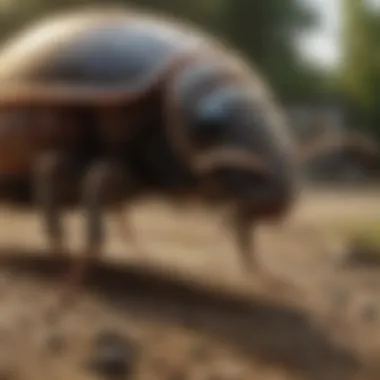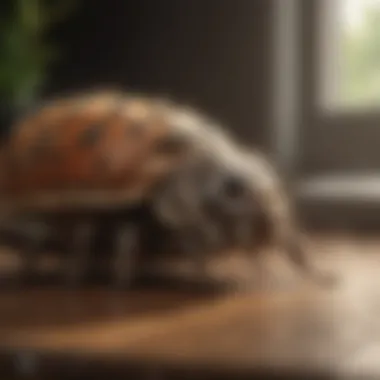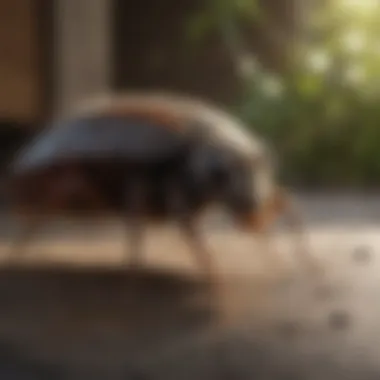Pest Control Solutions for Greenville, NC Homeowners


Intro
Pest control is a pressing concern for homeowners in Greenville, NC. This region, with its unique climate and environment, presents specific challenges to residents when it comes to managing uninvited critters. Not only can pests damage property, but they can also pose health risks. Therefore, understanding how to identify, prevent, and handle pest issues is essential for maintaining a safe and comfortable home.
In this guide, we will delve into the various aspects of pest control tailored specifically for Greenville. From recognizing common household pests to employing effective prevention tactics, we aim to equip residents—whether seasoned homeowners or new renters—with valuable information that grapples with local nuances.
We’ll also address treatment options, looking at both natural and chemical solutions while considering the ecological impact of pest management techniques. Our goal is to foster a more knowledgeable approach, enabling individuals to make informed decisions for both the wellbeing of their household and the surrounding environment.
Let’s begin by dissecting the various pests that often intrude on our homes.
Prolusion to Pest Control
Understanding pest control isn’t just about dealing with unwanted critters; it’s about creating a safe and comfortable living environment. Greenville, NC, with its diverse natural landscapes, can be a haven for various pests. This section dives into why pest control matters, highlights common pests faced by residents, and provides foundational knowledge for effective prevention and management strategies.
Importance of Pest Control
Pest control goes beyond mere inconvenience. An unchecked pest infestation can lead to property damage, health risks, and discomfort in daily routines. Here’s why prioritizing pest control is crucial for homeowners and renters alike:
- Preservation of Property: Pests like termites can silently wreak havoc. If not addressed, they can compromise the structural integrity of a home, leading to costly repairs.
- Health Protection: Many common pests, such as rodents or cockroaches, can carry diseases that threaten family health. By managing pest populations, families can avoid these potentially hazardous situations.
- Peace of Mind: Living in a pest-free environment contributes to a calm home atmosphere, allowing individuals to focus on what truly matters without the distractions of unwanted guests.
In Greenville, where moisture levels can encourage pests to thrive, the importance of proactive pest control becomes even more pronounced. Homeowners should educate themselves on pest identification and management to safeguard their homes effectively.
Overview of Common Pests in Greenville
In Greenville, residents frequently encounter a variety of pests that pose challenges. Familiarizing oneself with these pests can help in identifying issues before they escalate. Here are some common nuisances:
- Ants: Often invaders of kitchens, they can form trails that lead to food sources.
- Cockroaches: Shuttle unseen during the day, becoming notorious for their rapid reproduction, they can turn a safe home into a breeding ground.
- Termites: Silent destroyers, these pests feast on wood structures, posing a significant risk, especially in older buildings.
- Rodents: Known for chewing through wires and wood, their presence can signify a deeper problem. Moreover, they potentially carry diseases.
- Bed Bugs: These pests can hide in bedding and luggage, leading to distressing bites and sleep disturbances.
Recognizing the signs of these pests early can drastically affect the effective management of infestations. This serves as a crucial step in the comprehensive journey of pest control in Greenville.
Identifying Pests in Greenville
Identifying pests in Greenville is crucial for combating unwanted guests in your home, ensuring you can take action before things get out of hand. Properly identifying these critters helps homeowners distinguish between minor nuisances and serious threats to health and property. For instance, not all bugs are bad, but those that invade your personal space tend to cause headaches and heartaches alike. Therefore, knowing how to spot them early can save both time and money.
Common Household Pests
Ants
Ants can be quite the annoyance when they invade your kitchen or pantry. These social insects are known for their organized colonies and can quickly turn a small problem into a big one. Carpenter ants, in particular, eat away at wooden structures, which can compromise your home’s integrity. Their presence is often marked by tiny piles of sawdust around the area where they're active. Recognizing the species can inform your approach. For example, red imported fire ants can deliver painful bites. Having this knowledge helps ascertain whether they pose a more considerable risk or are merely scavengers.
Cockroaches
We’ve all heard the saying, "If you see one cockroach, there are many more hiding." Cockroaches are notorious for being night crawlers, quite literally. These pests are resilient and multiply rapidly, which makes them hard to eradicate once they set up shop. Their droppings can lead to allergies and asthma, particularly in children. If you see a cockroach during the day, consider it a warning that an infestation is on your doorstep. It’s not just about getting rid of them; it’s about preventing future invaders.
Termites
Termites are silent destroyers, often going unnoticed until significant damage is done. They feed on cellulose found in wood and plants, making your home a buffet if you’re not careful. Signs of termites include soft, hollow-sounding wood, mud tubes along walls, and discarded wings. Because they can ruin wooden structures, understanding how to identify them is essential. When you catch them early, you might save yourself a hefty repair bill.
Rodents
Rodents, like mice and rats, can wreak havoc on your home. Not only do they gnaw on things they shouldn’t—think wires and food—they also carry diseases. Identifying rodent droppings or nestled nests in hidden corners can help you nip a potential problem in the bud. Their behavior shifts based on season; for example, when the temperature drops, they will look for warmer spots inside your home. Monitoring this seasonal behavior is crucial for effective pest management.


Bed Bugs
Bed bugs, those unwelcome nighttime visitors, can turn restful sleep into a nightmare. They are small, flat, and reddish-brown; they thrive in the seams of mattresses and bedding. The telltale signs of bed bugs include red bites on the skin, often in a line, and dark spots on your sheets. Understanding how to identify these pests can lead to quicker action before their numbers swell.
Signs of Infestation
Recognizing the signs of an infestation can be the difference between an easy fix and a costly headache.
- Physical Evidence: Look for droppings, discarded wings, or shed skin, which indicate that pests are around.
- Sounds: unusual noises like scratching or scurrying can point to rodent activity.
- Damage: gnaw marks on furniture or walls are red flags pointing towards an infestation.
- Allergic Reactions: Increased allergy symptoms may mean that pests like cockroaches or dust mites are present.
Identifying these signs early on allows you to take proactive measures against pest invasions. Don't let an unknown situation be a permanent issue in your household.
Pest Control Methods
Understanding the various pest control methods is vital for homeowners and renters in Greenville, NC. These methods go beyond mere extermination; they encompass a thoughtful approach to managing unwanted pests while also considering the health of the environment. Choosing the right pest control technique can save you money in the long run and create a healthier living space. It’s particularly important to combine strategies that are effective yet responsible, ensuring a balance between immediate results and long-term sustainability.
Chemical Solutions
When it comes to getting rid of pests quickly, chemical solutions often come to mind. Products like insecticides and rodenticides are widely available and can offer rapid relief from infestations. Advantages of chemical solutions include:
- Quick action: Many chemical solutions can start working within hours.
- Wide availability: Homeowners can easily purchase these products at local stores or online.
- Targeted treatment: Specific chemicals can effectively deal with particular pests, making it easier to choose the right remedy.
However, there are considerations here. Excessive chemical use can lead to resistance among pests. Moreover, these substances can affect non-target species, including pets and beneficial insects. Using chemicals requires careful reading of labels and following all safety instructions. For some folks, the fear of chemical exposure could lead to reconsideration, leading them to explore alternatives.
Natural Remedies
An increasing number of people are leaning towards natural remedies in their pursuit of pest control. These eco-friendly methods often involve household ingredients or natural substances which may pose less risk to humans and pets. Some popular natural solutions include:
- Essential oils: Oils like peppermint or tea tree can deter ants, spiders, and other pests due to their strong scents.
- Diatomaceous earth: A fine powder that dehydrates insects, aiding in tackling bed bugs and cockroaches.
- Vinegar: A simple spray of vinegar mixed with water can repel ants and household pests.
One of the major benefits of using natural remedies is the peace of mind—minimal impact on the environment and safety for children and pets. Nevertheless, the effectiveness might take longer to realize compared to chemical formulas, and in some cases, these remedies can be less potent, requiring diligent reapplication.
Integrated Pest Management (IPM)
Integrated Pest Management (IPM) blends different pest control techniques, promoting a holistic strategy rather than a one-size-fits-all solution. This method stresses the importance of:
- Monitoring and identification: Rather than just jumping in with treatments, understanding which pests are present and their behaviors is crucial.
- Prevention: This is the cornerstone of the IPM approach. By eliminating conducive conditions—like sealing cracks or controlling moisture—pests can often be stopped before they become a problem.
- Combination of tactics: IPM recommends employing a variety of methods, from cultural and physical to biological and chemical measures when necessary.
"The goal of IPM is to minimize risks to human health and the environment while effectively managing pest populations."
This method may require more planning and understanding but can lead to greater long-term success in pest management. By being aware of species’ life cycles and environmental conditions, individuals can make informed choices about when and how to intervene.
In summary, selecting the right pest control method hinges on understanding the advantages and potential drawbacks of chemical solutions, natural remedies and IPM. By ensuring that you choose a method matching your specific needs and values, you can help secure your home from unwanted pests while maintaining a healthy living environment.
Prevention Strategies
Preventing pests in your home isn't just good practice—it's an essential part of maintaining a safe and healthy living environment. Residents of Greenville can testify to the challenges pests can present, but with a little foresight, you can keep these unwanted visitors at bay. From simple home care measures to strategic landscaping tips, understanding how to prevent pest infestations can save you time, money, and a whole lot of frustration.
One key benefit of implementing preventive strategies is the reduction of pest populations before they become a significant issue. Furthermore, many pest control methods focus on treating existing problems instead of addressing the root causes that allowed those pests to invade. Prevention, therefore, becomes a proactive approach that is not only more effective but also more economical than reactive strategies.
Home Maintenance Tips


A well-maintained home is the first line of defense against pest infestations. Here are some home maintenance tips that can keep your space pest-free:
- Seal Cracks and Gaps: Inspect your home for any cracks or gaps in walls, windows, and doors. Ensure that these areas are properly sealed using caulk or weather stripping.
- Proper Waste Management: Garbage should be stored in airtight containers to keep pests like rats and ants from having a feast. Take out the trash regularly and promptly clean up food spills to avoid attracting them.
- Clutter Control: Keep indoor spaces uncluttered. Pests often find cozy hiding spots in stacks of newspapers, cardboard, or clothes.
"An ounce of prevention is worth a pound of cure."
Landscaping and Yard Care
Your yard can attract or deter pests, depending on how you manage it. Smart landscaping decisions can go a long way in pest prevention:
- Choose the Right Plants: Some plants naturally repel pests. Consider incorporating marigolds or lavender, which can deter insects.
- Keep Vegetation Trimmed: Overgrown shrubs and trees can provide shelter for pests. Keeping plants trimmed and away from the house reduces the chance of pests finding a way inside.
- Eliminate Standing Water: Pools of stagnant water can attract mosquitoes. Regularly check and clean gutters, ponds, and bird baths to prevent water accumulation.
Regular Inspections
Conducting regular inspections is crucial in maintaining a pest-resistant home. Check the following areas frequently:
- Basements and Attics: These spaces often go unnoticed and can be easy entry points for pests. Look for signs of infestations like droppings or nests.
- Painting and Wood Structures: Inspect wooden structures for signs of termite damage or rot, which can provide entry points for various pests.
- Plumbing Areas: Leaks and damp areas can attract pests like cockroaches. Ensure that plumbing systems are leak-free and in good condition.
By taking these prevention strategies seriously, you'll pave the way for a more comfortable and pest-free living experience, setting the stage for effective pest control both now and in the future.
Pest Control Services in Greenville
When it comes to maintaining a pest-free environment, residents of Greenville, NC, often find they need the expertise provided by professional pest control services. This is not merely about dealing with a nuisance; it’s fundamentally about preserving health, property, and peace of mind. As pests can bring about a host of problems ranging from property damage to health concerns, engaging qualified service providers is crucial for effective management.
One of the primary benefits of utilizing pest control services is their deep understanding of local pest behavior. Greenville experiences a unique climate that can foster specific infestations, like termites during humid summer months or rodents seeking warmth in winter. Trained specialists possess the knowledge and tools to identify not just visible pests but also the conditions that may lead to infestations.
Another point to consider is safety. Many over-the-counter products can be hazardous if not used correctly. Professionals understand how to apply their treatments safely, ensuring that both residents and pets are protected during the process. Additionally, pest control companies often utilize environmentally friendly approaches, reflecting a growing concern for sustainable practices in pest management.
In effect, choosing the right pest control service can save both time and money over the long term. Recurrent infestations can lead to higher repair costs and potential health issues, but with regular professional interventions, these risks diminish significantly.
"Preventing a pest problem is far more cost-effective than dealing with an established infestation."
As residents consider these important factors, they can make informed decisions about pest control services tailored to their specific needs.
Choosing a Local Pest Control Company
Finding the right local pest control company can feel akin to finding a needle in a haystack, but some key factors can steer you in the right direction. First, consider reputation. Online reviews and local recommendations carry weight; they reflect real experiences from your neighbors.
Questions to Guide Your Search:
- Are they licensed and insured? A valid license indicates they adhere to local regulations.
- What methods do they employ? Ensure their methods align with your preferences, especially if you lean toward eco-friendly practices.
- Do they offer a guarantee? Companies that stand behind their work often provide peace of mind through service guarantees.
When reaching out for quotes or information, pay attention to their customer service. Are they responsive? Do they take the time to answer questions thoroughly? Strong communication skills are often a good indicator of service quality.
What to Expect from Professional Services
Once you’ve selected a pest control service, understanding what happens next can ease anxiety and shape expectations. Typically, the process begins with an initial consultation. This involves a thorough inspection of your property, wherein the technician identifies any signs of infestations and potential entry points.
Following this, the service provider will present a tailored plan. This plan outlines the methods to be used, the timeline for treatment, and any necessary preparations on your part. Get everything in writing, don’t be shy to ask for clarifications.


During Treatment, You Might Experience:
- Temporary restrictions on certain areas of your home.
- Recommendations for sealing off entry points or improving sanitation to prevent new infestations.
After treatment, there’s usually a follow-up visit scheduled to ensure the plan’s effectiveness and to assess any further needs. Depending on the pest and treatment method, you may receive guidance on maintenance to help keep pests at bay in the future.
Environmental Considerations
Understanding the interplay between pest control and the environment is critical, especially for residents in Greenville, NC. As homeowners strive to keep their living spaces free from unwanted critters, it’s essential to consider the broader impact of our actions on the local ecosystem. This section delves into how pest management can affect not only the immediate environment but also the overall health of our shared habitats.
Impact of Pesticides on Ecosystem
When applying pesticides, the immediate goal is often to eliminate the pests that threaten our homes. However, this practice can have unintended consequences on the surrounding ecosystem. Pesticides, designed to target specific pests, can sometimes harm beneficial insects like bees and ladybugs. These creatures play a pivotal role in pollination and maintaining ecological balance. Furthermore, when rain washes these chemicals into nearby waterways, it can cause water contamination, affecting aquatic life and disrupting local food chains.
"Nature knows best; troubling the balance often leads to unforeseen challenges."
We must also consider the impact on soil health. Chemicals can alter the microbiome of the soil, essential for healthy plant growth. Homeowners should weigh the convenience of chemical solutions against the long-term health of their gardens and landscapes. The effects of pesticides can linger, affecting generations of soil quality and biodiversity.
Sustainable Pest Management Practices
To mitigate the adverse effects of traditional pest control methods, many are turning to sustainable practices. These methods champion a more harmonious relationship between humans and nature, reducing harmful chemical usage while effectively addressing pest issues.
- Integrated Pest Management (IPM): This approach combines various management strategies to minimize risks to human health and the environment. It includes techniques like regular monitoring of pest populations and using physical barriers to prevent infestations.
- Natural Pest Deterrents: Homeowners are increasingly looking for homemade solutions that leverage common household items. For example, vinegar and baking soda can work wonders to deter pests from crawling spaces when used thoughtfully.
- Encouraging Beneficial Wildlife: Planting native species can attract natural predators of common pests. For instance, ladybugs can help control aphid populations, and birds can assist in keeping insect numbers down.
- Companion Planting: This gardening technique involves pairing plants that naturally deter pests with those that are more susceptible. For example, marigolds can help keep nematodes at bay while complementing vegetable gardens.
Sustainable management isn’t just about preventing pest problems; it also fosters community awareness about the local ecosystem. Neighborhood workshops and local farming initiatives can spread knowledge, encouraging a collective effort towards eco-friendly pest control.
Fostering a sustainable environment requires diligence and a willingness to adapt. By implementing thoughtful pest management strategies, homeowners in Greenville can contribute significantly to preserving the ecological integrity of their surroundings.
Common Myths about Pest Control
Pest control isn't just about zapping pesky creatures. It intertwines with understanding people's beliefs and fears about pests. Many around Greenville, NC, hold misconceptions that can complicate effective management. Clarifying these myths can empower homeowners with proper knowledge. This section aims to shed light on common myths regarding pest control, paving the way for informed decisions.
Debunking Popular Misconceptions
In today’s world, where misinformation can spread faster than wildfire, pest control is no exception. Let’s break down some entrenched beliefs that don't hold water:
- Myth: If you can’t see pests, they aren't present
Many assume that a clean house means it's pest-free. In reality, pests often operate behind the scenes – in attics, walls, or kitchens. Just because you don't see them, doesn't imply they aren’t there. For home-owners, regular inspections can help spot signs of trouble early. - Myth: All pest control methods are harmful
There's a widespread notion that all chemical solutions are dangerous. While some products carry risks, there are plenty of safer alternatives available. Homeowners can utilize natural remedies and Integrated Pest Management (IPM) strategies that minimize chemicals while effectively tackling infestations. - Myth: You only need pest control in summer
While some pests become more active in warmer months, many species can thrive in winter too. Rodents, for example, often look for shelter indoors when temperatures drop. Infestations can strike any time of the year, so vigilance is crucial. - Myth: One treatment will solve everything
Treating one area might help in the short run, but pests can return if you don’t target their source. Consistent maintenance and monitoring are essential for preventing further issues. Effective pest management is an ongoing effort, not a one-time fix. - Myth: DIY is as effective as professional services
Many believe tackling pest issues themselves is just as efficacious as hiring experts. While DIY solutions can be helpful for minor problems, complex situations often require professional assessments. Pest technicians have specialized knowledge and tools to address infestations effectively.
Each of these misconceptions sheds light on the complex relationship between humans and the unwanted guests that invade our living spaces. By debunking them, residents can navigate pest control smarter. As home-owners, staying informed and proactive is the best defense against pest-related nuisances.
The End
In wrapping up this guide, it’s crucial to consider the significance of effective pest control within a local context like Greenville, NC. Pest control isn’t merely about getting rid of bothersome insects or rodents. It’s about maintaining a safe and healthy living environment for you and your family. Understanding the nuances of pest behavior and the local ecosystem can dramatically influence the effectiveness of your pest management strategies.
Summary of Key Points
In this comprehensive guide, we’ve covered some significant aspects of pest control in Greenville:
- Identifying pests early can save time and money. Knowing what you’re up against helps in targeting the right control methods.
- Different control methods are available, ranging from chemical solutions to more natural remedies. Each has its advantages and situational appropriateness.
- Prevention strategies are paramount. Basic home maintenance, yard care, and regular inspections can keep pests at bay before they become a problem.
- Choosing the right pest control service can make a world of difference. Local companies are familiar with the common pests of the area and can offer tailored solutions.
- Environmental considerations are emerging as vital in pest management. Being aware of the ecological impact means we can adopt more sustainable practices.
- Debunking myths surrounding pest control clears the way for more informed decisions and effective practices.
Final Thoughts on Effective Pest Management
As we navigate through the complexities of pest issues in Greenville, it’s clear that pest management is more than just a quick fix. It demands a mindful approach, combining prevention, identification, and treatment. The knowledge shared in this guide aims to equip homeowners with the tools and understanding to manage pests effectively. Ultimately, your home is your sanctuary. Prioritizing pest control not only protects your property but also ensures your family’s well-being. Always remember, an ounce of prevention is worth a pound of cure. A proactive mindset toward pest management can pave the road to a pest-free living space.
"The best way to control pests is to prevent them from entering your home in the first place."
With these insights, you should feel more empowered to face pest control challenges head-on. Let this guide act as a trusty companion in your journey toward a pest-free life.



